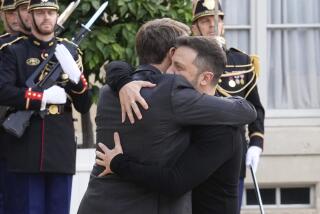Yeltsinâs Plan to End Chechen Conflict Is Foundering
MOSCOW â Eleven fruitless days after unveiling a peace plan for Chechnya, President Boris N. Yeltsinâs strategy for ending the war was wedged Thursday between a Russian army commander who vowed to âsmashâ the rebels if they do not surrender and a political ally who urged the president to talk directly with Chechen separatist leader Dzhokar M. Dudayev.
Daily reports of ongoing fighting, and tough talk from the Russian military, suggest that prospects for a quick resolution of the 16-month-old war may be evaporating along with Yeltsinâs nominal âcease-fire.â Yeltsin supporters are growing worried that their candidateâs chances in the June 16 presidential election are being irreparably damaged by his inability to end the fighting, which has claimed an estimated 30,000 lives.
Yeltsin has continued to press his proposal for the appointment of intermediaries to negotiate with Dudayev, who told reporters earlier this week that the war would be over âin 15 minutesâ if he and Yeltsin met face to face. Yeltsin has thus far refused such a meeting, flatly saying he will not meet with âterrorists.â
Among the mediators will likely be the presidents of Kazakhstan and Tatarstan, and talks reportedly could begin as early as Tuesday. The Tatarstan president, Mintimer S. Shaimiyev, already was trying to contact Dudayev, Interfax news agency reported Thursday.
But that approach strikes some of Yeltsinâs supporters as cumbersome and time-consuming, and they are urging the president to show his mettle by negotiating personally with Dudayev.
Boris Nemtsov, the liberal governor of Nizhny Novgorod and a respected reformer who has remained loyal to Yeltsin, said Thursday that the president needed to âenter into talks with Dudayev without delay.â In an interview with Interfax, Nemtsov urged Yeltsin to travel to the area to open a dialogue. âTime is running out,â Nemtsov said, offering to accompany Yeltsin.
The governor also chastised Yeltsinâs aides, saying that their determination to win the war in Chechnya, a predominantly Muslim area and major oil transshipment point, could cost Yeltsin the election.
âThe part of Yeltsinâs entourage which toys with illusions about the possibility of victory in the Chechen war not only leaves no chance for Yeltsin to implement his peace plan but also makes his defeat in the coming election possible,â Nemtsov said.
In addition to pursuing indirect talks with the rebels, Yeltsin promised to end Russiaâs offensive and partially withdraw the forces he had sent to put down the independence drive. He also pronounced himself open to negotiating some degree of autonomy for Chechnya within Russia.
But Russian military leaders, although applauding Yeltsinâs plan in public, seemed to be undermining it.
Gen. Anatoly Shkirko, commander of the Russian Interior Ministry troops, said Thursday that while large-scale military operations had ended, soldiers were still conducting âspecial operationsâ allowed under the presidentâs plan. While Russian military strategists believe they have the rebels on the run, he said the separatists also have a powerful defensive system capable of resisting Russian troops for a long time in the southern mountains.
âEither the fighters will be smashed or let them give up their weapons,â Shkirko told Interfax. âThis cannot be stopped halfway.â
Pavel Felgengauer, a respected defense correspondent for the daily newspaper Sevodnya in Moscow, said the Russian army is purposefully sending confusing signals to the public. âThey announce peace but they continue turning the screws on the Chechen separatists,â he said. âAnd it seems to be working.â
While public sentiment in Russia is about evenly divided on withdrawal from Chechnya, Chechen separatists also are torn between those who believe now is the time to exact concessions from a Russian president campaigning for reelection and others who want to fight to the finish.
Military analysts say the rebels, so close to defeat on the conventional battlefield, may feel they have only one option left--a spectacular terrorist attack. Such an attack could have broad ramifications in the presidential race, where Yeltsin faces a tough challenge from Communist leader Gennady A. Zyuganov.
More to Read
Sign up for Essential California
The most important California stories and recommendations in your inbox every morning.
You may occasionally receive promotional content from the Los Angeles Times.











